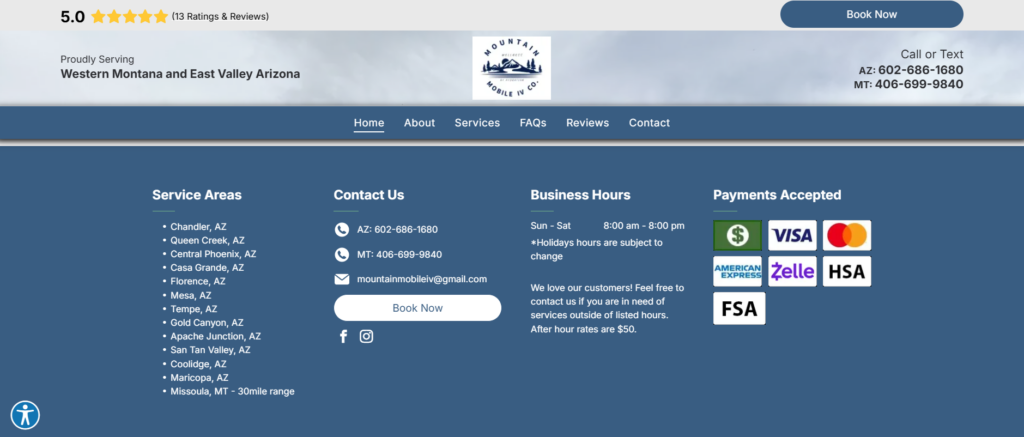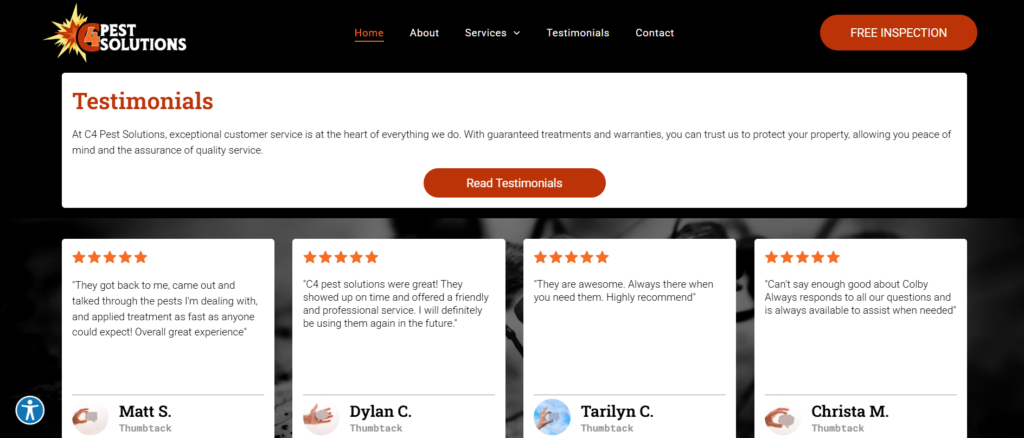
Why Trust Signals Are the Missing Link on Most Local Business Websites
Local businesses can point to several factors if they are losing customers, ranging from poor service to high prices. However, one of the most overlooked reasons could be a critical missing element on their own website: trust signals.
These seemingly small details can ultimately make or break a customer’s decision to choose your business over a competitor. According to a survey from Power Reviews of over 8,000 U.S. consumers, over 87% of shoppers do online research regularly before making a purchase, signifying trust signals have become more important than ever.
Trust signals entail things like reviews, certifications and accurate contact information, essential credibility indicators that local businesses should aim to put in front of customers on their website, particularly in competitive small and local business markets. A lack of trust makes consumers less likely to convert. However, this issue can be easily solved.
Here’s an in-depth look at different kinds of trust signals, their importance toward consumer decisions, how they can impact your business, and what needs to be done to ensure that your website builds reliability among your target audience.
What Are Trust Signals and Why Should Businesses Care?
Trust signals are elements on your website that help visitors feel secure, confident and ready to engage with your business. These cues can be visual, technical or content-based, and reassure customers that your company is credible and reliable enough to purchase from.
While users might not notice many of your website’s trust signals, their presence can play a big role in situations where someone is debating whether or not to make a purchase. Since purchasing online differs from in-store when you can try a product before buying it or speak directly with an employee, the more trust you can foster on your website, the better.
Consumers trusting in your brand has a significant impact on your bottom line. These buyers need confidence that your business delivers on its promises and trust signals can provide a notable credibility. According to eklipsecreative.com, 70% of consumers actively look for trust signals before completing a purchase.
Ultimately, trust signals aim to accomplish several goals. First and foremost, they should help your business gain credibility by showing consumers they can trust your brand, eventually helping gain loyal and longtime customers.
In addition, businesses can gain a competitive advantage over others who may be failing to build credibility through their website. While ultimately designed to gain trust among consumers, these signals can also foster reliability from search engines, potentially resulting in higher search ranking.
All in all, businesses that boost their reputation through trust signals will increase brand awareness, and in turn, conversions.
The Trust Gap That’s Costing You Sales
Whether searching for a plumber, bakery or wellness clinic, customers landing on a local business website are often looking for something that signals trust before making any decisions. Yet, many local business websites are still missing obvious credibility clues, sending potential buyers toward competitors.
While businesses are rightfully focused on SEO and paid advertising, they can’t overlook what happens after they get a potential buyer to their website. Many local businesses thrive on relationships, which now often begin online. Earning a consumer’s trust before meeting them face-to-face can go a long way in driving success.
One of the biggest trust signals among potential consumers is online reviews. According to Bright Local’s 2025 Local Consumer Review Survey, 71% of consumers regularly or always read online reviews for local businesses as they go through the buying process. Still, many businesses fail to display any reviews at all, or choose to bury them deep within their website.
Meanwhile, other important trust signals that indicate legitimacy, such as SSL certificates, Better Business Bureau (BBB) badges or up-to-date Google Maps listings, are also often overlooked. The results stemming from a lack of trust factors are often negative, as businesses can see higher bounce rates, lower engagement and missed conversion opportunities.
An In-Depth Look at 15 Significant Trust Signals
Businesses should aim to implement several trust signals within their website, including:
1. An up-to-date and mobile-optimized website
Above all, the first thing that may deem your business as trustworthy is your website. A clean, professional and modern layout can immediately signal legitimacy, while poor or clunky designs can be viewed as red flags. According to a survey from Hosting Advice, 75% of consumers have skipped an online purchase due to an outdated website, while 93% have expressed security concerns when coming across poorly designed websites.
Your website doesn’t need to be flashy, but it must clearly and consistently display your brand identity. The same principle applies to the mobile version of your website, as it should be responsive to all screen sizes with fast loading speed, easy navigation and clear imagery. Both desktop and mobile sites should focus on user experience (UX), giving consumers a seamless conversion process.
2. Verified customer reviews
Businesses should encourage customers to leave reviews on Google, Yelp and social platforms. Displaying positive and detailed reviews on your website can be arguably the biggest trust signal there is, proving that the products or services your business provides benefit consumers. The more reviews the better, as Bright Local notes that 69% of consumers believe businesses need to have at least 20 reviews for them to trust their average rating.
Businesses can also decipher the profile strength of reviewers, as reviews from established Google accounts with profile photos or prior review history can carry more weight compared to reviews from a new or potentially illegitimate account.
3. Case studies and testimonials
A good testimonial tells a specific story beginning with the issue the customer had, how the business solved it and the positive result the consumer received. Similar to testimonials, a case study should convey a positive story. This again begins with a specific client, what issue they had and what your business did to solve the problem. Case studies should include a detailed outcome displaying the value provided.
4. User-generated content (UGC)
UGC goes hand-in-hand with testimonials, providing social proof that your products benefit consumers. Whether it is through photos, social media clips or unpackaging videos, potential buyers get a visual image of what it might look like to own a product or utilize a service.
Many consumers will place a higher level of trust in the opinions of other buyers compared to the business itself. Businesses can attempt to obtain UGC through things like post-purchase emails, social media contests or other incentives.
5. Industry certifications or memberships
Certifications, memberships and accreditations are all significant trust builders. These can come from entities such as the BBB, or industry-specific associations. According to a survey from TrustedSite, 83% of consumers are more likely to trust a website that displays reputable third-party trust badges compared to one that doesn’t.
Businesses should aim to earn any industry-specific certifications or accreditations that they can, such as a Michelin star for restaurants, or a HIPPA certification for a healthcare facility.
6. Partnerships with other businesses or entities
Depending on the industry, your business may be partnered with or utilize products from notable brand names. Similar to any kind of certification or memberships, adding the logos of companies that you might be affiliated with can also prove legitimacy.
7. Secure site connections (HTTPS)
SSL certificates must be updated from HTTP to HTTPS, signifying that your website is secure. Browsers like Google Chrome will alert users if a website they are about to visit doesn’t have HTTPS, driving most customers away before they even reach your site.
8. Clear and updated contact information
This includes business name, address and phone number (NAP), along with perhaps an email address or live chat bot feature. All contact information should be clear, up to date and consistent across your website, and it should exactly match what might be listed across other online directories, such as your Google Business Profile – another trust signal for consumers outside of your website.
These items are typically listed on a contact page or in the website footer. Inconsistent NAP data in particular can decrease credibility, as 46% of consumers lose trust in a business after seeing an incorrect address, while 45% lose trust after encountering an incorrect phone number, according to Bright Local.
9. Media mentions or press badges
Featuring media mentions is an easy way to signify the validity of your business. Anywhere your business is positively featured in articles, multimedia or by a reputable news source should be prominently displayed and is information visitors can easily verify.
10. Links to social media with active engagement
All businesses should link their social media accounts to their website, giving users additional avenues to learn more about your business while further proving your credibility.
Businesses should be sure to remain active and engaging on social media as a result. Social shares may not be a trust signal by themselves, but any content that is heavily shared or by authoritative sources can add legitimacy to your product or service.
11. Money-back guarantees, warranties and privacy policies
It is important to have vital information like warranties, guarantees, return policies and privacy policies displayed and easily accessible on your website. Offering a 100% refund within 30 days if a customer isn’t satisfied, or a free trial for a specific service, shows customers that you are confident in what your business offers while reducing any potential concerns. Having detailed delivery and returns policies can help avoid disputes.
A proper privacy policy page should describe things like how your website uses cookies, users’ personal data and whether or not you share that data with third-party entities. While most will never read these policies, they are necessary to display, often on the footer of your website, to avoid potential conflict. Within these sections, businesses should be sure to keep whatever promises they are making, avoiding any negative reviews and reputation damage that could occur if they don’t.
12. Secure payment and website details
It’s essential for potential customers who may purchase from you online to see that your website is secure and that they won’t be suspect to scams. Businesses can add secure payment logos to show who is processing the payment while subsequently informing customers of accepted payment types.
Logos from popular entities like Visa, Mastercard or PayPal can form a sense of security once shoppers get to the payment process. Additionally, third-party badges from firms like Norton or McAfee show to users that your website is regularly monitored for security threats.
13. Trustworthy statistics
Adding various statistics that prove the legitimacy of your business and the value it provides can further signal trust among potential customers. This may include the number of years you’ve been in business, the number of clients you have or the number of sales you have made. These numbers can be updated frequently, showing that your business is continuing to grow successfully while also signaling activeness.
14. Up-to-date and informational content
Having accurate content, whether that be landing page copy, blogs or product/service information, can help your site be viewed as informative and educational, potentially generating additional trust in your services or products. More specifically, product and service descriptions should be detailed and promote what value they will provide the consumer.
Making sure all content is well-written, follows SEO guidelines and conveys proper grammar and tone of voice is imperative. Businesses can also look to insert various keywords that could help improve search ranking. A searchable help center that offers live chat and support can be beneficial as well, perhaps putting less stress on employees.
15. Information about your company and employees
This information is often best conveyed through an “About Us” page that thoroughly explains what you are about and proves that you are not a scammy entity. This can be a spot where you share insights from your team through links to blog posts, podcasts or LinkedIn posts. Your brand’s voice should shine through, explaining your history and values. The more detail about your company and industry, the better.
The page can also include employee bios, and should feature images of people who actually work at the company rather than stock photos. Listing employee certifications or achievements can build even more trust depending on the industry. In addition, any philanthropic efforts your business or employees have recently made, like charitable contributions or positive environmental practices, can also be added to further improve brand image.
The goal of each of these trust signals is to reduce uncertainty, reassure visitors and drive conversions. They essentially function as a form of digital word-of-mouth, reinforcing credibility before a customer makes any kind of purchasing decision.
How Trust Signals Influence SEO and Mobile Behavior
While the most direct impact of trust signals comes from consumer behavior, they also play a role when it comes to SEO. Google and other search engines will often favor websites with high engagement and low bounce rates. Both of these metrics improve when users feel confident in your business and stay on your website.
Additionally, online reviews and ratings play a role in local SEO rankings. Positive reviews can increase visibility in search results while also boosting click-through rates (CTRs). The more trust signals present, the more likely users are to engage, sending positive behavioral signals to search engines.
Trust is also an important factor when it comes to mobile usability. Fast-loading, well-structured and trust-optimized mobile sites hold attention better and convert more leads. According to Kanopi Studios, 60% of users will not trust a company that has not optimized for mobile, while 57% of users won’t recommend a business with a bad mobile site.
Common Trust Signal Mistakes Local Businesses Make
Local Businesses that implement trust signals on their website should avoid some common pitfalls. Some of the top mistakes companies make include:
- Outdated testimonials – Testimonials should be recent and relevant. Having a testimonial from 2017 likely won’t build much trust among consumers in 2025.
- Fake or unverifiable reviews – Any fake or unverifiable reviews can be harmful for a business. Most consumers can identify dishonest feedback, resulting in a significant loss of trust.
- Inconsistent branding or design – Any website that is not up to date or has an outdated design can signal an instant lack of trust. So too can a mobile website that is not optimized.
- Broken trust badges or expired SSL certificates – These should be easy errors to spot for businesses. As a result, outdated badges and certificates may scream negligence or laziness to consumers and deter them from staying on your website.
- No social proof – Social presence is important for local businesses. Lacking user engagement or social links can limit credibility.
Adding trust signals is significant for all businesses, but paying attention to detail matters when doing so, as they should be authentic, visible and current.
Building Trust Into Your Local Business Website
Improving trust signals on your website requires some work, but it doesn’t mean a total redesign is in order. Here are the basic steps businesses should take to earn more trust on their site:
1. Showcase reviews prominently
Customer reviews can be embedded on a website’s homepage, service pages or in sidebars. Businesses should use platforms like Google, Yelp or industry-specific directories for added credibility.
2. Use third-party badges and certifications
Any memberships with local chambers, the BBB or professional guilds should be highlighted. Associations with these entities signal legitimacy and reliability.
3. Make contact information easy to find
Contact information like your phone number, email address or physical address should be easy to find. Business hours should be updated regularly, while a Google Maps embed is also a beneficial feature.
4. Add real photos and staff bios
Stock photography can be useful and look good, but it may also lower trust. Real team photos and bios humanize your brand and can increase relatability.
5. Highlight guarantees and policies
Elements like refund policies, warranties or satisfaction guarantees can signal legitimacy and reliability among consumers, and should be transparent. They should also be displayed where customers make decisions, such as service or checkout pages.
6. Keep content fresh and updated
Having a blog on your website that hasn’t been updated in years may raise questions. So too could an outdated footer. Regular updates signal that you are active and attentive.
7. Ensure site security
Security is an important trust signal for consumers, and should be a high priority for any business, particularly those that collect user data. Using HTTPS encryption and SSL trust badges can help customers feel more secure while on your website.
8. Track the impact of trust signals
As with anything that can impact a marketing strategy, businesses should track the effects of trust signals by first identifying where they appear on your site and measuring what users do when they see them. A good way to do this is through heatmaps, showing where customers may be hovering or clicking when it relates to various trust signals. A/B tests can be conducted when it comes to placement, design and format of trust signals, while engagement and conversion rates should be tracked after implementation to measure effectiveness.
Examples of Real-World Local Businesses Displaying Website Trust Signals
From small businesses to corporate giants, all companies can look to gain credibility and reliability through the trust signals they display on their website. Here’s a look at some local businesses that have implemented important trust signals on their website:
Dayhoff Construction
Dayhoff Construction, a company specializing in roofing, siding and gutter needs based in Pennsylvania, conveys multiple trust signals on its website, including reviews, easily accessible contact information and an “About” page. However, some of the most notable trust signals come at the bottom of the homepage where Dayhoff Construction lists its accreditations and certifications, and its partnerships with other notable companies within the industry.

Mountain Mobile IV
Mountain Mobile IV, a therapy service serving parts of Montana and Arizona, also features numerous trust signals on its website, including customer reviews, contact information and social media links. One of Mountain Mobile IV’s top features comes at the bottom of its homepage where the company lists various payment logos, letting users know what kind of payment it accepts while reinforcing a secure payment process.

C4 Pest Solutions
C4 Pest Solutions, serving the Phoenix metro area, is another local business proudly displaying trust signals on its website with a quality “About Us” page, an offer for a free estimate and contact information in multiple locations. What really stands out about C4 Pest Solutions’ homepage is its testimonials section, featuring multiple positive stories about the company, and a link to read more if users are still seeking additional credibility.

Best Version Media Can Help Boost Your Trusted Website
Best Version Media can help your website gain trust and credibility among consumers through our online presence management, including monitoring listings and reviews across all platforms, from one convenient dashboard.
BVM can also help get more customers to your trusted website by managing geo-targeted social and display ad campaigns.
Connect with BVM today to further enhance your digital marketing strategy.
Written by Cody Kluge
BVM Digital Content Specialist





